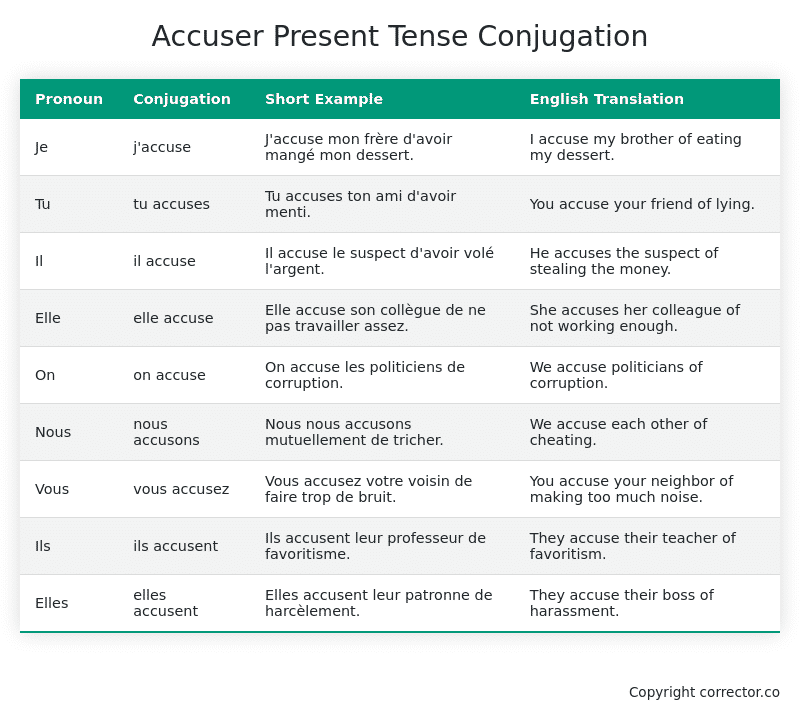Le Present (Present Tense) Conjugation of the French Verb accuser
Introduction to the verb accuser
The English translation of the French verb “accuser” is “to accuse.” The infinitive form of the verb “accuser” is pronounced as [a-ky-zey].
Accuser comes from the Latin word “accusare,” which means “to blame, to accuse.” In everyday French, it is most often used to express the act of accusing someone of something.
Examples:
- Il m’accuse de voler son argent. (He accuses me of stealing his money.)
- Les témoins l’ont accusé d’avoir menti. (The witnesses accused him of lying.)
- Elle a été accusée de trahison. (She was accused of treason.)
Accuser – About the French Present Tense
To take a deep dive into all the French tenses then see our article on Mastering French Tense Conjugation.
Common Everyday Usage Patterns For Le Present
Interactions with Other Tenses
Table of the Present Tense Conjugation of accuser
| Pronoun | Conjugation | Short Example | English Translation |
|---|---|---|---|
| Je | j’accuse | J’accuse mon frère d’avoir mangé mon dessert. | I accuse my brother of eating my dessert. |
| Tu | tu accuses | Tu accuses ton ami d’avoir menti. | You accuse your friend of lying. |
| Il | il accuse | Il accuse le suspect d’avoir volé l’argent. | He accuses the suspect of stealing the money. |
| Elle | elle accuse | Elle accuse son collègue de ne pas travailler assez. | She accuses her colleague of not working enough. |
| On | on accuse | On accuse les politiciens de corruption. | We accuse politicians of corruption. |
| Nous | nous accusons | Nous nous accusons mutuellement de tricher. | We accuse each other of cheating. |
| Vous | vous accusez | Vous accusez votre voisin de faire trop de bruit. | You accuse your neighbor of making too much noise. |
| Ils | ils accusent | Ils accusent leur professeur de favoritisme. | They accuse their teacher of favoritism. |
| Elles | elles accusent | Elles accusent leur patronne de harcèlement. | They accuse their boss of harassment. |
Other Conjugations for Accuser.
Le Present (Present Tense) Conjugation of the French Verb accuser (You’re reading it right now!)
Imparfait (Imperfect) Tense Conjugation of the French Verb accuser
Passé Simple (Simple Past) Tense Conjugation of the French Verb accuser
Passé Composé (Present Perfect) Tense Conjugation of the French Verb accuser
Futur Simple (Simple Future) Tense Conjugation of the French Verb accuser
Futur Proche (Near Future) Tense Conjugation of the French Verb accuser
Plus-que-parfait (Pluperfect) Tense Conjugation of the French Verb accuser
Passé Antérieur (Past Anterior) Tense Conjugation of the French Verb accuser
Futur Antérieur (Future Anterior) Tense Conjugation of the French Verb accuser
Subjonctif Présent (Subjunctive Present) Tense Conjugation of the French Verb accuser
Subjonctif Passé (Subjunctive Past) Tense Conjugation of the French Verb accuser
Subjonctif Imparfait (Subjunctive Imperfect) Tense Conjugation of the French Verb accuser
Subjonctif Plus-que-parfait (Subjunctive Pluperfect) Tense Conjugation of the French Verb accuser
Conditionnel Présent (Conditional Present) Tense Conjugation of the French Verb accuser
Conditionnel Passé (Conditional Past) Tense Conjugation of the French Verb accuser
Conditionnel Passé II (Conditional Past II) Tense Conjugation of the French Verb accuser
L’impératif Présent (Imperative Present) Tense Conjugation of the French Verb accuser
L’impératif Passé (Imperative Past) Tense Conjugation of the French Verb accuser
L’infinitif Présent (Infinitive Present) Tense Conjugation of the French Verb accuser
L’infinitif Passé (Infinitive Past) Tense Conjugation of the French Verb accuser
Le Participe Présent (Present Participle) Tense Conjugation of the French Verb accuser
Le Participe Passé (Past Participle) Tense Conjugation of the French Verb accuser
Struggling with French verbs or the language in general? Why not use our free French Grammar Checker – no registration required!
Get a FREE Download Study Sheet of this Conjugation 🔥
Simply right click the image below, click “save image” and get your free reference for the accuser present tense conjugation!

I hope you enjoyed this article on the verb accuser. Still in a learning mood? Check out another TOTALLY random French verb present conjugation!


